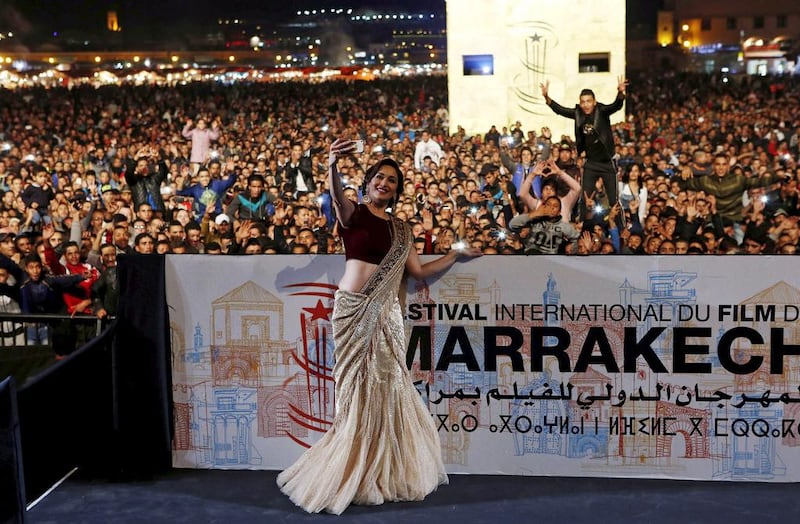On Friday night, tens of thousands of fans converged on the Marrakech International Film Festival to honour Bollywood actress Madhuri Dixit-Nene, who was bestowed with a tribute alongside other international stars including Hollywood greats Bill Murray and Willem Dafoe.
Dixit-Nene is an actress extraordinaire, but her status as one of the best dancers to grace the silver screen is legendary. Since the birth of her two children, however, seeing her on screen is like trying to spot a shooting star. She has appeared in only five films since 2002 – her most recent was last year's critically acclaimed Gulaab Gang. Since 2010 she has served as one the celebrity judges on the popular Indian television reality show Jhalak Dikhhla Jaa, the Indian version of the BBC's Strictly Come Dancing.
I catch up with the 48-year-old star the morning after her red carpet appearance. Clad in a gorgeous sari and sitting in the gardens of La Mamounia hotel, she says there is no particular reason why she isn’t seen on the big screen more often.
"You have to find the right script, something that inspires you, that you must do. I have yet to find a film that I want to do," says the star of beloved classics such as Devdas (2002) and Dil (1990). She says that while scripts are constantly sent to her, "nothing fits".
I wonder if this is because Indian cinema has changed radically during the decade she spent raising a family in the United States, especially on the independent film scene, where movies that would have once caused shock have become the norm.
“I think as the world changes, cinema changes; even in India the outlook changes,” she says. “The world has become so small, that it’s no longer different countries – it is just one small world. All those changes will be reflected in cinema.”
But while opportunities for actresses are slowly getting bigger and better, Bollywood is still beset with ageism when it comes to female talent. Now 48, Dixit-Nene’s 30 years of experience is formidable, yet there remains a lack of roles for mature women.
Looking back at her early years in the industry, she mentions the time she was cast in the romantic drama Dil in 1990. It was fun, she tells me, because it was the first time she was cast opposite an actor – Aamir Khan – who was her age.
Khan and fellow male stars Shah Rukh Khan and Salman Khan all turned 50 this year, yet still command leading roles in big-budget blockbusters. They are also paid much more than their female co-stars, who all tend to be below 30. An example is the recently released Prem Ratan Dhan Payo, in which Salman was paired with Sonam Kapoor, 30.
“The men are seen as ‘virile’,” says Dixit-Nene, explaining the reason behind the rampant inequality. “They could be, like, 80 years old and will still be considered for lead roles. I think things are changing, very subtly, but I am hopeful there will be a massive change soon.
“That said, I think the kind of roles that have been written for women have changed for the better. Before, there used to be only two roles that we used to get as women; we would play the victim or the aggressor.”
A case is point is her Devdas co-star Aishwarya Rai Bachchan, who returned this year after a five-year sabbatical to star in a powerful role in Jazbaa. Did Dixit-Nene give her advice on making a comeback?
“You don’t have to really personally go there and advise someone,” says the actress.
“Everybody is looking at everybody else’s work and they are drawing inspiration from that, and whether it was missteps or great steps, everybody learns from just watching.” Dixit-Nene has been a pioneer in changing perceptions of the worth of older actresses.
“If you see the kind of roles I have done; even when it was a chauvinistic, male-dominated kind of industry, I still managed to do something where my role was on a par with the hero of the film. And so that is what I will keep doing. Even if it’s a little role where you can assert yourself, that can make a big difference.”
In 2011, Dixit-Nene returned to Mumbai after a long break from Bollywood, much to the delight of her fans.
“A lot of things played into this decision,” she says. “My parents were getting older and I wanted my kids to be exposed to India. When you move to a new country, or the place where I grew up, you see so much and learn so much. I wanted my children to be open-minded and learn what poverty is. I also wanted them to learn our culture and see it more closely.
“When we lived in America, there were only so many lives we could touch. We came back thinking, it’s time to give back and what can we do to affect people’s lives and to give them some skill sets? That’s why I founded Dance with Madhuri, an online academy where you can learn dancing.”
The newly launched website, which offers free access to tutorials on various dance forms, from classical Indian to hip-hop, is already a hit with young fans in India and worldwide.
Does she plan to return to the US and maybe follow in the footsteps of colleague Priyanka Chopra, who has a starring role in ABC network's TV crime thriller Quantico?
“If I do get an opportunity, something that’s big and right for my stature, then yes, of course, I’d like to do it,” she says.
artslife@thenational.ae






